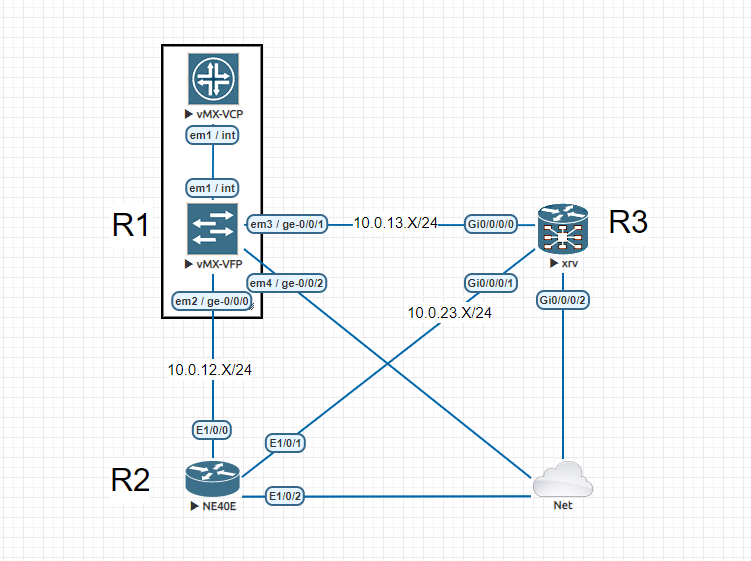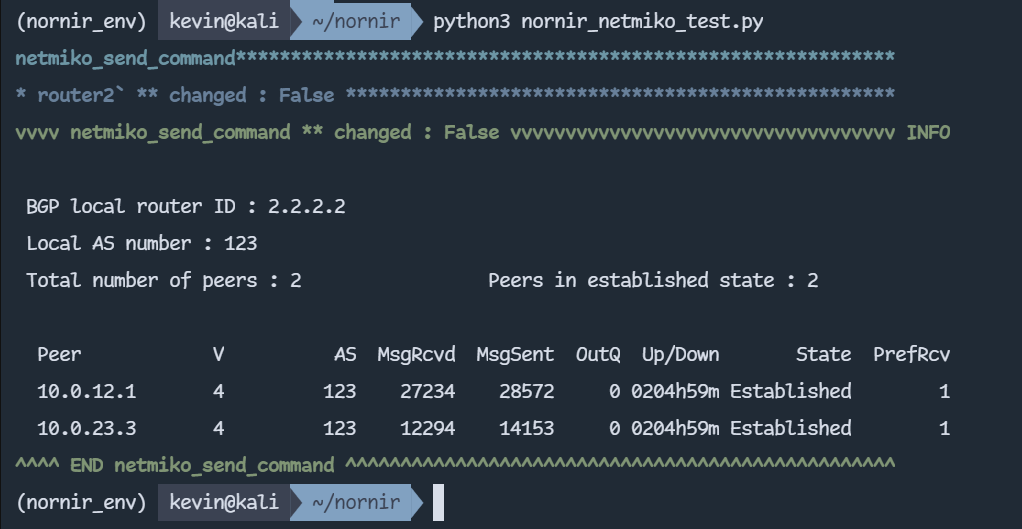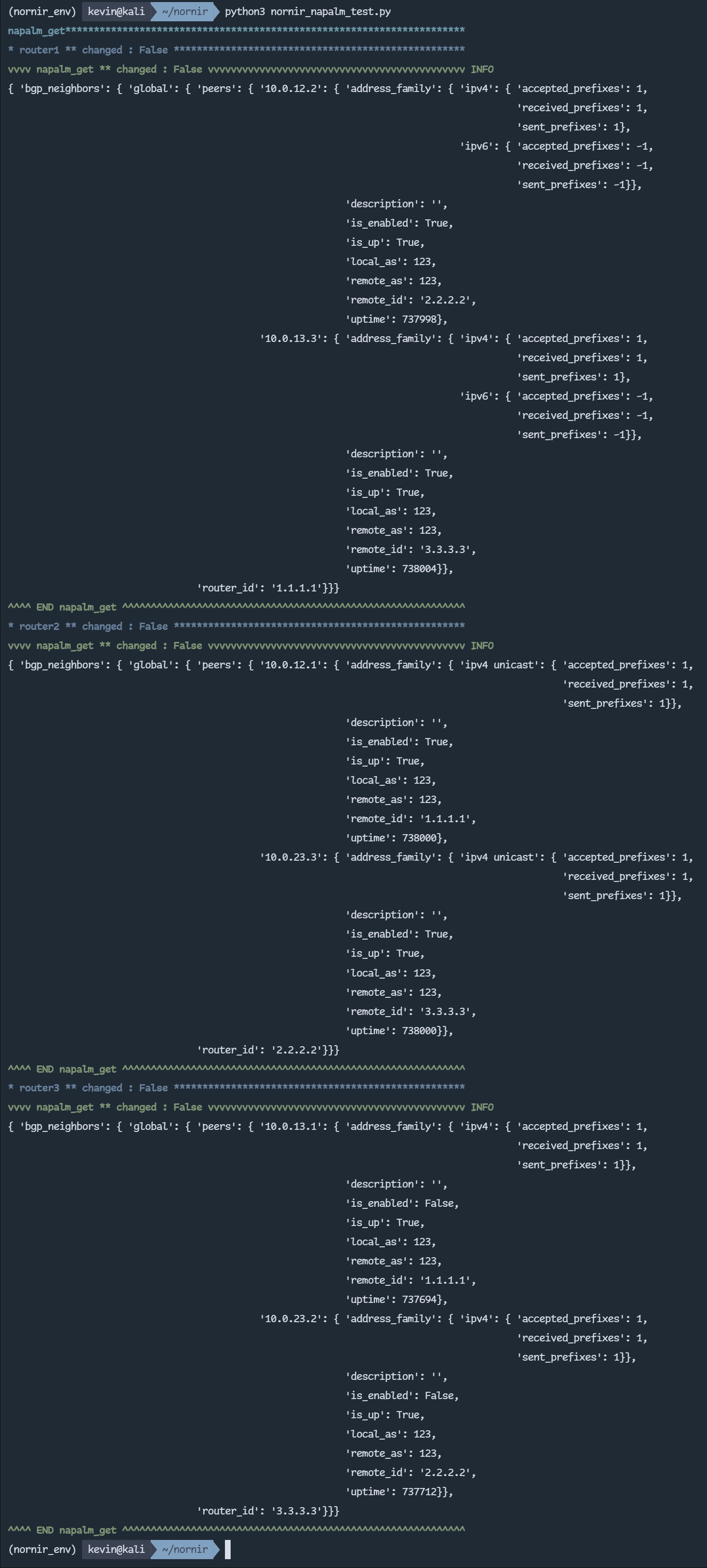
This post is an introduction and comparison of network automation tools Paramiko, Netmiko, NAPALM, Ansible and Nornir. Before we break down the tools, I feel obliged to discuss how different automation tools work and what their differences are.
I’m not an expert in any of the following tools by any stretch, but I will try to describe these in layman’s terms based on my experience.
- Paramiko: Just a handy Python SSH library, used for ssh-ing (obviously) to devices.
- Netmiko: Another Python SSH library based on Paramiko, but geared more towards network devices. Unlike Paramiko, it supports Telnet. When combined with Python scripts, this tool is sufficient to kickstart your network automation. It’s very easy to get started and see the results of your commands printed, and screen scrape the things you need with regex, or even better if you use TextFSM & NTC templates for parsing results. One small caveat is that you must handle multi-threading yourself if you intend to use Netmiko for a large-scale network.
- NAPALM: A Python library/framework that supports multiple vendors using API. It’s an abstraction framework, and NAPALM’s underlying network drivers will enable it to return the same output for your request (for example: get_interfaces, get_facts), regardless of which type of device you’re working on. If your devices are not fully supported, you have the option to write your own Python library (which I tried, and I don’t recommend; I’ll discuss this in detail later in the post). The NAPALM framework can be used in conjunction with Ansible, Salt and Nornir.
- Ansible: One of the best-known automation tools. The thing with Ansible is that you have to write Ansible playbooks in YAML, which is a double-edged sword; it doesn’t require you to know how to code in Python, but working with only YAML takes away the flexibility of your automation tasks. Ansible, in my opinion, is better suited for the overall environment rather than network devices.
- Nornir: A Python framework explicitly made for network devices, developed and maintained by the same people who did NAPALM and Netmiko. It’s 100% Python, the framework is written in Python, and you write Python code in order to use Nornir. NAPALM and Netmiko libraries can act as getters and connection drivers for Nornir. Also, Nornir is multi-threaded and it’s absurdly fast compared to Ansible.
There are some other automation tools that I didn’t mention, like Scrapli, Puppet, Chef, Salt, pyATS, and so on.
Testing automation tools
In this section, I’m going to show the basic usage of some of the tools: Netmiko, NAPALM, and Nornir. For SSH connectivity, first, enable SSH on each device:
Juniper Junos: 20.4R3.8:
set system login user juniper class super-user authentication plain-text-password
set system services ssh root-login allow
set system services ssh protocol-version v2
set system services ssh connection-limit 10Huawei VRP: 8.180:
aaa
local-user huawei password irreversible-cipher $1c$jF...
local-user huawei service-type telnet ssh
local-user huawei state block fail-times 3 interval 5
user-interface vty 0 4
authentication-mode aaa
user privilege level 3
idle-timeout 0 0
stelnet server enable
ssh user huawei
ssh user huawei authentication-type all
ssh user huawei service-type all
ssh authorization-type default password
Cisco IOS-XR: 6.1.3:
crypto key generate rsa
ssh server v2
line console transport input allThe above commands will give full SSH connectivity from outside the virtual machine (VM) I’m using. Both my EVE-NG VM and my Linux VM (Kali Linux) are configured as NAT, and I will run my automation setup on Kali Linux. Since my NAT is using the 192.168.13.0/24 subnet, I’ve modified the interface addresses between the routers to 10.0.XY.X, instead of the 192.168.XY.X pool. All three devices are connected to the Management(Cloud0) node, ensuring their connectivity to my Kali Linux (Figure 1).

Netmiko
Here is a very simple example of how to use the Netmiko ConnectHandler to retrieve show command output from routers. In this example, the send_command() method will return the interface description and IP addresses of each device. If you want to convert the result to structured data, you might want to use TextFSM & NTC templates.
#netmiko_test.py
from netmiko import ConnectHandler
juniper_vMX = {
'device_type': 'juniper',
'ip': '192.168.13.11',
'username': 'juniper',
'password': 'Juniper'
}
net_connect = ConnectHandler(**juniper_vMX)
output = net_connect.send_command("show interface terse")
print("Juniper IP:\n\n"+output+"\n---------------------------------------\n")
huawei_vrp = {
'device_type': 'huawei',
'ip': '192.168.13.22',
'username': 'huawei',
'password': 'Admin@1231'
}
net_connect = ConnectHandler(**huawei_vrp)
output = net_connect.send_command("display ip int br")
print("Huawei IP:\n\n"+output+"\n---------------------------------------\n")
ios_xr = {
'device_type': 'cisco_xr',
'ip': '192.168.13.33',
'username': 'cisco',
'password': 'cisco'
}
net_connect = ConnectHandler(**ios_xr)
output = net_connect.send_command("show ip int br")
print("Cisco IP:\n\n"+output+"\n---------------------------------------\n")
NAPALM
My plan was to retrieve the Border Gateway Protocol (BGP) neighbor information with NAPALM. NAPALM is a very straightforward tool if all of your device types are supported. However, that’s not the case in our scenario.
Huawei routers are not officially supported by NAPALM; there is a community NAPALM library (NAPALM-Huawei-VRP), but that only has minimal functions built-in. My only option was to write my own functions based on the community version. While I was doing my research, I found out that I wasn’t the only one who had attempted this. Michael Alvarez did some heavy lifting but his code was still missing some parts. Use the following code snippet for the Huawei VRP platform BGP neighbor implementation. My GitHub repo has the complete code so that you don’t have to reinvent the wheel.
@staticmethod
def bgp_time_conversion(bgp_uptime):
"""
Convert string time to seconds.
Examples
00:14:23
00:13:40
00:00:21
00:00:13
00:00:49
1d11h
1d17h
1w0d
8w5d
1y28w
never
"""
bgp_uptime = bgp_uptime.strip()
uptime_letters = set(['w', 'h', 'd', 'm'])
if 'never' in bgp_uptime:
return -1
elif ':' in bgp_uptime:
times = bgp_uptime.split(":")
times = [int(x) for x in times]
hours, minutes, seconds = times
return (hours * 3600) + (minutes * 60) + seconds
# Check if any letters 'w', 'h', 'd' are in the time string
elif uptime_letters & set(bgp_uptime):
form0 = r'(\d+)h(\d+)m' # 03h21m
form1 = r'(\d+)d(\d+)h' # 1d17h
form2 = r'(\d+)w(\d+)d' # 8w5d
form3 = r'(\d+)y(\d+)w' # 1y28w
match = re.search(form0, bgp_uptime)
if match:
hours = int(match.group(1))
minutes = int(match.group(2))
return (hours * 3600) + (minutes * 60)
match = re.search(form1, bgp_uptime)
if match:
days = int(match.group(1))
hours = int(match.group(2))
return (days * DAY_SECONDS) + (hours * 3600)
match = re.search(form2, bgp_uptime)
if match:
weeks = int(match.group(1))
days = int(match.group(2))
return (weeks * WEEK_SECONDS) + (days * DAY_SECONDS)
match = re.search(form3, bgp_uptime)
if match:
years = int(match.group(1))
weeks = int(match.group(2))
return (years * YEAR_SECONDS) + (weeks * WEEK_SECONDS)
raise ValueError("Unexpected value for BGP uptime string: {}".format(bgp_uptime))
## custom bgp config for VRP, reference:https://codingnetworks.blog/napalm-network-automation-python-collect-data-from-multiple-vendors/
def get_bgp_neighbors(self):
"""
Returns a dictionary of dictionaries. The keys for the first dictionary will be the vrf
(global if no vrf). The inner dictionary will contain the following data for each vrf:
* router_id
* peers - another dictionary of dictionaries. Outer keys are the IPs of the neighbors. \
The inner keys are:
* local_as (int)
* remote_as (int)
* remote_id - peer router id
* is_up (True/False)
* is_enabled (True/False)
* description (string)
* uptime (int in seconds)
* address_family (dictionary) - A dictionary of address families available for the \
neighbor. So far it can be 'ipv4' or 'ipv6'
* received_prefixes (int)
* accepted_prefixes (int)
* sent_prefixes (int)
Note, if is_up is False and uptime has a positive value then this indicates the
uptime of the last active BGP session.
Example::
{
"global": {
"router_id": "10.0.1.1",
"peers": {
"10.0.0.2": {
"local_as": 65000,
"remote_as": 65000,
"remote_id": "10.0.1.2",
"is_up": True,
"is_enabled": True,
"description": "internal-2",
"uptime": 4838400,
"address_family": {
"ipv4": {
"sent_prefixes": 637213,
"accepted_prefixes": 3142,
"received_prefixes": 3142
},
"ipv6": {
"sent_prefixes": 36714,
"accepted_prefixes": 148,
"received_prefixes": 148
}
}
}
}
}
}
"""
afi_supported = {
"Ipv6 Unicast" : "ipv6 unicast",
"Ipv4 Unicast" : "ipv4 unicast",
"Vpnv4 All" : "vpnv4 unicast",
"Vpnv6 All" : "vpnv6 unicast"
}
bgp_neighbors = {}
command_bgp = "display bgp all summary"
output = self.device.send_command(command_bgp)
if output == "":
return bgp_neighbors
ASN_REGEX = r"[\d\.]+"
IP_ADDR_REGEX = r"\d{1,3}\.\d{1,3}\.\d{1,3}\.\d{1,3}"
IPV4_ADDR_REGEX = IP_ADDR_REGEX
IPV6_ADDR_REGEX_1 = r"::"
IPV6_ADDR_REGEX_2 = r"[0-9a-fA-F:]{1,39}::[0-9a-fA-F:]{1,39}"
IPV6_ADDR_REGEX_3 = r"[0-9a-fA-F]{1,3}:[0-9a-fA-F]{1,3}:[0-9a-fA-F]{1,3}:[0-9a-fA-F]{1,3}:" \
r"[0-9a-fA-F]{1,3}:[0-9a-fA-F]{1,3}:[0-9a-fA-F]{1,3}:[0-9a-fA-F]{1,3}"
# Should validate IPv6 address using an IP address library after matching with this regex
IPV6_ADDR_REGEX = r"(?:{}|{}|{})".format(IPV6_ADDR_REGEX_1, IPV6_ADDR_REGEX_2, IPV6_ADDR_REGEX_3)
IPV4_OR_IPV6_REGEX = r"(?:{}|{})".format(IPV4_ADDR_REGEX, IPV6_ADDR_REGEX)
#Regular Expressions
re_separator = r"\n\s*(?=Address Family:\s*\w+)"
re_vpn_instance_separator = r"\n\s*(?=VPN-Instance\s+[-_a-zA-Z0-9]+)"
re_address_family = r"Address Family:(?P<address_family>\w+\s\w+)"
re_global_router_id = r"BGP local router ID :\s+(?P<glob_router_id>\d{1,3}\.\d{1,3}\.\d{1,3}\.\d{1,3})"
re_global_local_as = r"Local AS number :\s+(?P<local_as>{})".format(ASN_REGEX)
re_vrf_router_id = r"VPN-Instance\s+(?P<vrf>[-_a-zA-Z0-9]+), [rR]outer ID\s+" \
r"(?P<vrf_router_id>\d{1,3}\.\d{1,3}\.\d{1,3}\.\d{1,3})"
re_peers = r"(?P<peer_ip>({})|({}))\s+" \
r"(?P<as>{})\s+\d+\s+\d+\s+\d+\s+(?P<updown_time>[a-zA-Z0-9:]+)\s+" \
r"(?P<state>[a-zA-Z0-9\(\)]+)\s+(?P<received_prefixes>\d+)\s+(?P<adv_prefixes>\d+)".format(
IPV4_ADDR_REGEX, IPV6_ADDR_REGEX, ASN_REGEX)
re_remote_rid = r"Remote router ID\s+(?P<remote_rid>{})".format(IPV4_ADDR_REGEX)
re_peer_description = r"Peer's description:\s+\"(?P<peer_description>.*)\""
re_accepted_routes = r"Received active routes total:\s+(?P<accepted_routes>.*)"
#Separation of AFIs
afi_list = re.split(re_separator, output, flags=re.M)
#return afi_list
bgp_global_router_id = ""
bgp_global_local_as = ""
for afi in afi_list:
match_afi = re.search(re_global_router_id,afi, flags=re.M)
match_local_as = re.search(re_global_local_as,afi, flags=re.M)
if match_afi is not None:
bgp_global_router_id = match_afi.group('glob_router_id')
bgp_global_local_as = match_local_as.group('local_as')
match_afi = re.search(re_address_family, afi, flags=re.M)
if match_afi is not None and any((s in match_afi.group('address_family') for s in ['Ipv4 Unicast','Ipv6 Unicast'])):
bgp_neighbors.update({"global": {"router_id": bgp_global_router_id, "peers" : {}}})
for peer in afi.splitlines():
match_peer = re.search(re_peers, peer, flags=re.M)
if match_peer:
peer_bgp_command = ""
if "Ipv6" in match_afi.group('address_family'):
peer_bgp_command = "display bgp ipv6 peer {} verbose".format(match_peer.group('peer_ip'))
else:
peer_bgp_command = "display bgp peer {} verbose".format(match_peer.group('peer_ip'))
peer_detail = self.device.send_command(peer_bgp_command)
match_remote_rid = re.search(re_remote_rid, peer_detail, flags=re.M)
match_peer_description = re.search(re_peer_description, peer_detail, flags=re.M)
match_accepted_routes = re.search(re_accepted_routes,peer_detail, flags=re.M )
bgp_neighbors["global"]["peers"].update( {
match_peer.group('peer_ip'): {
"local_as": int(bgp_global_local_as),
"remote_as": int(match_peer.group('as')),
"remote_id": "" if match_remote_rid is None else match_remote_rid.group('remote_rid'),
"is_up": True if "Established" in match_peer.group('state') else False,
"is_enabled": False if "Admin" in match_peer.group('state') else True,
"description": "" if match_peer_description is None else match_peer_description.group('peer_description'),
"uptime": int(self.bgp_time_conversion(match_peer.group('updown_time'))),
"address_family": {
afi_supported[match_afi.group('address_family')]: {
"received_prefixes": int(match_peer.group('received_prefixes')),
#"accepted_prefixes": "Unknown",
"accepted_prefixes": int(match_accepted_routes.group('accepted_routes')),
"sent_prefixes": int(match_peer.group('adv_prefixes'))
}
}
}
})
elif match_afi is not None and any((s in match_afi.group('address_family') for s in ['Vpnv4 All','Vpnv6 All'])):
if bgp_neighbors['global'] is False:
bgp_neighbors.update({"global": {"router_id": bgp_global_router_id, "peers" : {}}})
#Separation of VPNs
vpn_instance_list = re.split(re_vpn_instance_separator, afi, flags=re.M)
for vpn_peers in vpn_instance_list:
if "VPN-Instance " not in vpn_peers:
for peer in vpn_peers.splitlines():
match_peer = re.search(re_peers, peer, flags=re.M)
if match_peer:
if bgp_neighbors["global"]["peers"][match_peer.group('peer_ip')]:
bgp_neighbors["global"]["peers"][match_peer.group('peer_ip')]["address_family"].update(
{
afi_supported[match_afi.group('address_family')]: {
"received_prefixes": int(match_peer.group('received_prefixes')),
"accepted_prefixes": "Unknown",
"sent_prefixes": int(match_peer.group('adv_prefixes'))
}
}
)
else:
peer_bgp_command = ""
if "Ipv6" in match_afi.group('address_family'):
peer_bgp_command = "display bgp ipv6 peer {} verbose".format(match_peer.group('peer_ip'))
else:
peer_bgp_command = "display bgp peer {} verbose".format(match_peer.group('peer_ip'))
peer_detail = self.device.send_command(peer_bgp_command)
match_remote_rid = re.search(re_remote_rid, peer_detail, flags=re.M)
match_peer_description = re.search(re_peer_description, peer_detail, flags=re.M)
bgp_neighbors["global"]["peers"].update( {
match_peer.group('peer_ip'): {
"local_as": int(bgp_global_local_as),
"remote_as": int(match_peer.group('as')),
"remote_id": "" if match_remote_rid is None else match_remote_rid.group('remote_rid'),
"is_up": True if "Established" in match_peer.group('state') else False,
"is_enabled": False if "Admin" in match_peer.group('state') else True,
"description": "" if match_peer_description is None else match_peer_description.group('peer_description'),
"uptime": int(self.bgp_time_conversion(match_peer.group('updown_time'))),
"address_family": {
afi_supported[match_afi.group('address_family')]: {
"received_prefixes": int(match_peer.group('received_prefixes')),
"accepted_prefixes": "Unknown",
"sent_prefixes": int(match_peer.group('adv_prefixes'))
}
}
}
})
else:
match_vrf_router_id = re.search(re_vrf_router_id, vpn_peers, flags=re.M)
if match_vrf_router_id is None:
msg = "No Match Found"
raise ValueError(msg)
peer_vpn_instance = match_vrf_router_id.group('vrf')
peer_router_id = match_vrf_router_id.group('vrf_router_id')
bgp_neighbors.update({peer_vpn_instance: {
"router_id": peer_router_id, "peers" : {}}})
for peer in vpn_peers.splitlines():
match_peer = re.search(re_peers, peer, flags=re.M)
if match_peer:
peer_bgp_command = ""
afi_vrf = ""
if "Ipv6" in match_afi.group('address_family'):
peer_bgp_command = "display bgp ipv6 peer {} verbose".format(match_peer.group('peer_ip'))
afi_vrf = "ipv6 unicast"
else:
peer_bgp_command = "display bgp peer {} verbose".format(match_peer.group('peer_ip'))
afi_vrf = "ipv4 unicast"
peer_detail = self.device.send_command(peer_bgp_command)
match_remote_rid = re.search(re_remote_rid, peer_detail, flags=re.M)
match_peer_description = re.search(re_peer_description, peer_detail, flags=re.M)
bgp_neighbors[peer_vpn_instance]["peers"].update( {
match_peer.group('peer_ip'): {
"local_as": int(bgp_global_local_as),
"remote_as": int(match_peer.group('as')),
"remote_id": "" if match_remote_rid is None else match_remote_rid.group('remote_rid'),
"is_up": True if "Established" in match_peer.group('state') else False,
"is_enabled": False if "Admin" in match_peer.group('state') else True,
"description": "" if match_peer_description is None else match_peer_description.group('peer_description'),
"uptime": int(self.bgp_time_conversion(match_peer.group('updown_time'))),
"address_family": {
afi_vrf: {
"received_prefixes": int(match_peer.group('received_prefixes')),
"accepted_prefixes": "Unknown",
"sent_prefixes": int(match_peer.group('adv_prefixes'))
}
}
}
})
return bgp_neighborsNow the NAPALM library is finally ready for action, let’s give it try!
#napalm_test.py
import napalm
def main():
driver_juniper = napalm.get_network_driver("junos")
driver_vrp = napalm.get_network_driver("huawei_vrp")
driver_ios = napalm.get_network_driver("iosxr")
juniper_router = driver_juniper(
hostname = "192.168.13.11",
username = "juniper",
password = "Juniper"
)
vrp_router = driver_vrp(
hostname = "192.168.13.22",
username = "huawei",
password = "Admin@1231"
)
ios_router = driver_ios(
hostname = "192.168.13.33",
username = "cisco",
password = "cisco"
)
print("Connecting to Juniper Router...")
juniper_router.open()
print("Checking Juniper Router BGP Neighbors:")
print(juniper_router.get_bgp_neighbors())
juniper_router.close()
print("Test Completed\n")
print("Connecting to Huawei Router...")
vrp_router.open()
print("Checking Huawei Router BGP Neighbors:")
print(vrp_router.get_bgp_neighbors())
vrp_router.close()
print("Test Completed\n")
print("Connecting to IOS Router...")
ios_router.open()
print("Checking IOS Router BGP Neighbors:")
print(ios_router.get_bgp_neighbors())
ios_router.close()
print("Test Completed\n")
if __name__ == "__main__":
main()
Unlike Netmiko, NAPALM generates structured results for each router. The BGP neighbor’s result is returned as a dictionary of dictionaries, as follows.
Juniper:
{
"global": {
"router_id": "1.1.1.1",
"peers": {
"10.0.12.2": {
"local_as": 123,
"remote_as": 123,
"remote_id": "2.2.2.2",
"is_up": True,
"is_enabled": True,
"description": "",
"uptime": 211073,
"address_family": {
"ipv4": {
"received_prefixes": 1,
"accepted_prefixes": 1,
"sent_prefixes": 1,
},
"ipv6": {
"received_prefixes": -1,
"accepted_prefixes": -1,
"sent_prefixes": -1,
},
},
},
"10.0.13.3": {
"local_as": 123,
"remote_as": 123,
"remote_id": "3.3.3.3",
"is_up": True,
"is_enabled": True,
"description": "",
"uptime": 211079,
"address_family": {
"ipv4": {
"received_prefixes": 1,
"accepted_prefixes": 1,
"sent_prefixes": 1,
},
"ipv6": {
"received_prefixes": -1,
"accepted_prefixes": -1,
"sent_prefixes": -1,
},
},
},
},
}
}
Huawei:
{
"global": {
"router_id": "2.2.2.2",
"peers": {
"10.0.12.1": {
"local_as": 123,
"remote_as": 123,
"remote_id": "1.1.1.1",
"is_up": True,
"is_enabled": True,
"description": "",
"uptime": 211080,
"address_family": {
"ipv4 unicast": {
"received_prefixes": 1,
"accepted_prefixes": 1,
"sent_prefixes": 1,
}
},
},
"10.0.23.3": {
"local_as": 123,
"remote_as": 123,
"remote_id": "3.3.3.3",
"is_up": True,
"is_enabled": True,
"description": "",
"uptime": 211080,
"address_family": {
"ipv4 unicast": {
"received_prefixes": 1,
"accepted_prefixes": 1,
"sent_prefixes": 1,
}
},
},
},
}
}
Cisco:
{
"global": {
"peers": {
"10.0.13.1": {
"local_as": 123,
"remote_as": 123,
"remote_id": "1.1.1.1",
"description": "",
"is_enabled": False,
"is_up": True,
"uptime": 211044,
"address_family": {
"ipv4": {
"received_prefixes": 1,
"accepted_prefixes": 1,
"sent_prefixes": 1,
}
},
},
"10.0.23.2": {
"local_as": 123,
"remote_as": 123,
"remote_id": "2.2.2.2",
"description": "",
"is_enabled": False,
"is_up": True,
"uptime": 211062,
"address_family": {
"ipv4": {
"received_prefixes": 1,
"accepted_prefixes": 1,
"sent_prefixes": 1,
}
},
},
},
"router_id": "3.3.3.3",
}
}
With nested dictionaries, you can easily access the elements using the [ ] syntax. This line of code returns the BGP uptime of peer 10.0.12.2 in seconds:
print (juniper_router.get_bgp_neighbors()['global']['peers']['10.0.12.2']['uptime'])
> 211073Nornir
To initialize Nornir, we’ll use the SimpleInventory plugin, which stores all the relevant data in three files (hosts.yaml, groups.yaml, and defaults.yaml).
hosts.yaml:
---
router1:
hostname: 192.168.13.11
username: juniper
password: Juniper
groups:
- juniper
router2:
hostname: 192.168.13.22
username: huawei
password: Admin@1231
groups:
- huawei
router2`:
hostname: 192.168.13.22
username: huawei
password: Admin@1231
groups:
- huawei_vrpv8
router3:
hostname: 192.168.13.33
username: cisco
password: cisco
groups:
- ciscogroups.yaml:
---
cisco:
platform: ios-xr
huawei:
platform: huawei_vrp
huawei_vrpv8:
platform: huawei_vrpv8
juniper:
platform: junos
defaults.yaml:
---
username: juniper
password: Juniper
We need a config.yaml file to let Nornir know we have inventory files ready for Nornir. You can change the multi-thread option in this file as well.
#config.yaml
---
inventory:
plugin: SimpleInventory
options:
host_file: "hosts.yaml"
group_file: "groups.yaml"
defaults_file: "defaults.yaml"
runner:
plugin: threaded
options:
num_workers: 100
Now we can create Nornir object:
from nornir import InitNornir
nr = InitNornir(config_file="config.yaml")
As mentioned, Nornir supports third-party plugins such as Netmiko, Scrapli, NAPALM, Ansible, Jinja2, Netbox, and so on. Let’s see how we can use Netmiko and NAPALM within Nornir.
Nornir with Netmiko plugin
First off, we’ll try the Netmiko plugin. Let’s make it more fun with the use of Nornir filter function to select a specific group of routers in our inventory and show the BGP neighbor information on that router with Netmiko. Getting the command results requires importing the plugin and running only one line of code:
#nornir_netmiko_test.py
from nornir import InitNornir
from nornir_netmiko import netmiko_send_command
from nornir_utils.plugins.functions import print_result
from nornir.core.filter import F
nr = InitNornir(config_file="config.yaml")
group1 = nr.filter(F(groups__contains="huawei_vrpv8"))
results = group1.run(netmiko_send_command, command_string='dis bgp peer')
print_result(results)
Here is the result from the above code:

Nornir with NAPALM plugin
Now, let’s try the NAPALM plugin for Nornir. This time, I’m using the ~F function to filter routers that are not ‘huawei_vrpv8‘. Then, run the NAPALM getters to retrieve the BGP neighbor information:
#nornir_napalm_test.py
from nornir import InitNornir
from nornir_napalm.plugins.tasks import napalm_get
from nornir_utils.plugins.functions import print_result
from nornir.core.filter import F
nr = InitNornir(config_file="config.yaml", dry_run=True)
group2 = nr.filter(~F(groups__contains="huawei_vrpv8"))
results = group2.run(task=napalm_get, getters=["bgp_neighbors"])
print_result(results)
Again, the NAPALM plugin is capable of returning structured data for easier manipulation of the data.

Bug? Did you notice I had duplicates in hosts.yaml and groups.yaml file? That’s because Netmiko and NAPALM use different platform names for Huawei VRP routers, and a little workaround was needed to amend the incompatibility.
This post is merely scratching the surface of what Nornir and other automation tools can achieve, so…
Which automation tool should you use?
Nobody can tell you which automation tool is the best; it all depends on the scenario. A great way to start learning about automation is Python combined with Netmiko. Building a lab on either GNS3 or EVE-NG and writing some scripts will grow your confidence over time.
Although both Netmiko and NAPALM are great in a lab environment, with real-world use cases, you may need to take scalability and performance into consideration. I find Ansible and Nornir are more capable in real-world production networks. And, of course, you can make your own multiprocessing/multithreading script with lower-level automation tools as well, but it makes the code more complicated than necessary.
My personal choice of automation tool at the moment is Nornir, as it gives me the flexibility to write in Python. It’s very powerful when combined with various third-party tools, and it’s fast, according to this speed challenge.
Kevin Jin is a Senior Network Engineer and Solutions Manager at China Mobile International. His specialty is IP networking and global backbone design. He is also an advocate of Network Automation and NetDevOps.
This post was adapted from the original at Kevin Jin’s blog.
The views expressed by the authors of this blog are their own and do not necessarily reflect the views of APNIC. Please note a Code of Conduct applies to this blog.

Awesome article !
I often use netmiko and scrapli
Now, I’m gonna try nornir with netmiko
what about nornir with scrapli ?
Have you ever tried it ? what do you think of it ?